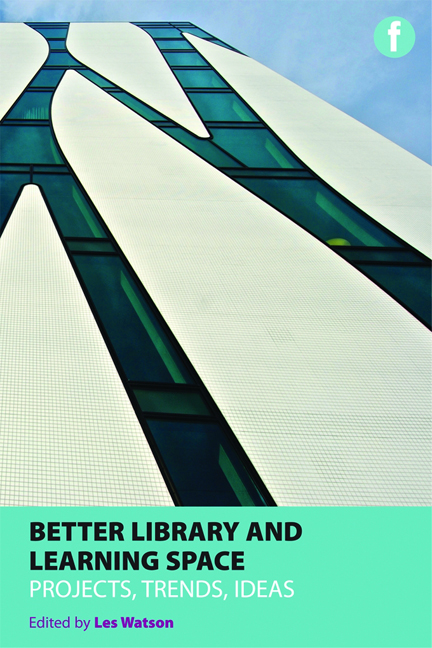Book contents
- Frontmatter
- Contents
- Case studies
- Acknowledgements
- Contributors
- Introduction – about this book
- PART 1 PROJECTS AND TRENDS
- PART 2 TRENDS AND IDEAS
- PART 3 IDEAS AND FUTURES
- Introduction
- 11 Beyond space: access is all – or is it?
- 12 Thinking inside the box
- 13 Nothing has changed/everything has changed – the enduring aspects of learning
- 14 Books, nooks and MOOCs
- 15 The researcher's view: context is critical
- 16 Libraries in the network society: evolution, revolution, extinction?
- 17 Powered by learning: developing models of provision to meet the expectations of new generations of students
- 18 The library has left the building
- 19 Beyond analogue: the learning studio as media-age library
- 20 3D libraries for 3D smarting
- 21 Learning landscapes, the library and the University of Lincoln: efficiency, effectiveness, expression and experimentation
- 22 Viral design: learners building better environments together
- 23 The interior designer's view
- 24 Furniture fit for the future – a brief exploration of library and learning furniture today and for the coming generation
- 25 Conclusions
- Index
11 - Beyond space: access is all – or is it?
from PART 3 - IDEAS AND FUTURES
Published online by Cambridge University Press: 08 June 2018
- Frontmatter
- Contents
- Case studies
- Acknowledgements
- Contributors
- Introduction – about this book
- PART 1 PROJECTS AND TRENDS
- PART 2 TRENDS AND IDEAS
- PART 3 IDEAS AND FUTURES
- Introduction
- 11 Beyond space: access is all – or is it?
- 12 Thinking inside the box
- 13 Nothing has changed/everything has changed – the enduring aspects of learning
- 14 Books, nooks and MOOCs
- 15 The researcher's view: context is critical
- 16 Libraries in the network society: evolution, revolution, extinction?
- 17 Powered by learning: developing models of provision to meet the expectations of new generations of students
- 18 The library has left the building
- 19 Beyond analogue: the learning studio as media-age library
- 20 3D libraries for 3D smarting
- 21 Learning landscapes, the library and the University of Lincoln: efficiency, effectiveness, expression and experimentation
- 22 Viral design: learners building better environments together
- 23 The interior designer's view
- 24 Furniture fit for the future – a brief exploration of library and learning furniture today and for the coming generation
- 25 Conclusions
- Index
Summary
Introduction
This chapter considers the future of physical library space from a higher education perspective and questions the future need for libraries – other than virtual ones. Reference is made to the work done in recent years by Jisc, though the views expressed here are those of the author and not the organization.
Out with the old; in with the new
Traditional academic libraries, their buildings, collections and services face an uncertain future, as demonstrated by the following quotation from a report by the University Leadership Council (2011), which enumerates the key drivers behind a fundamental change in thinking about ‘the library’:
Decreasing use of both traditional collections and the spaces in which they are contained has been combined in recent years with significant rises in the main costs associated with library provision. This is particularly evident in the dwindling importance of the library's collection size as an indicator of value in universities and the very low footfall by academic staff and research students, for whom ‘the library’ is – or is expected to be – at their fingertips. Increasingly, the creation, ownership, management and access to content rests outside the direct sphere of library-type services.
The University Leadership Council (2011) report also neatly summarized future requirements for what is increasingly being described as the ‘edgeless’ university:
Today's users require a new set of services and accommodations from the academic library that necessitate a strategic paradigm shift: from building and maintaining a collection to engaging with students and faculty, as well as providing space for study, collaboration, and creativity. Traditional organizational boundaries are likely to fade and the word ‘library’ will cease to adequately describe the suite of both virtual and physical academic support services offered to patrons.
There is little doubt that the major changes in the delivery and receipt of education are changing the ways in which library space is designed, built, used, re-used and refurbished. Hardly an academic year goes by without some new development that is likely to alter the education landscape. The recent advent of massive open online courses (MOOCs) is one of the more radical, with the potential to change the current distance and face-to-face teaching models irrevocably.
- Type
- Chapter
- Information
- Better Library and Learning SpaceProjects, trends and ideas, pp. 151 - 158Publisher: FacetPrint publication year: 2013



